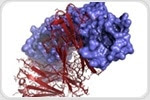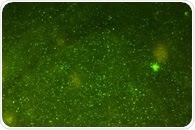|
| | April 3, 2019 | |
| | |
| | The latest drug discovery news from News Medical | |
|
|
 |
| |  Monitoring Ambient Environmental Conditions in the Lab Monitoring Ambient Environmental Conditions in the Lab Monitoring ambient environmental conditions in drug discovery labs, including temperature, pressure, humidity and light levels, is a crucial necessity. For example, in the pharmaceutical industry, the WHO offer guidance for the storage and transport of time- and temperature-sensitive pharmaceutical products, which necessitates monitoring and alarming for temperature and humidity. | |
|
|
|
|
 |
| |  In this interview, News-Medical speaks to Dr. Richard Eglen from Corning Life Sciences about the use of organoids in the drug discovery workflow, including the screening of candidate compounds for efficacy, toxicity, and pharmacokinetics. In this interview, News-Medical speaks to Dr. Richard Eglen from Corning Life Sciences about the use of organoids in the drug discovery workflow, including the screening of candidate compounds for efficacy, toxicity, and pharmacokinetics. | |
|
| |  Host cell proteins (HCPs) are cell-derived impurities that contaminate therapeutic proteins. Removing host cell proteins is crucial, as these proteins are immunogenic and can thus compromise the integrity of the final product. Host cell proteins (HCPs) are cell-derived impurities that contaminate therapeutic proteins. Removing host cell proteins is crucial, as these proteins are immunogenic and can thus compromise the integrity of the final product. | |
|
| |  Small molecule microarrays allow screening of biomolecules such as peptides and carbohydrates. By immobilizing these small molecules on a microarray, interactions can be quickly assessed through a high throughput process. Small molecule microarrays allow screening of biomolecules such as peptides and carbohydrates. By immobilizing these small molecules on a microarray, interactions can be quickly assessed through a high throughput process. | |
|
| |  Most drugs are develooped with a specific indication, without ever investigating the efficacy against other diseases. This article describes the benefits of drug repurposing over traditional drug development, and the scientific methods used to identify new uses of a drug. Most drugs are develooped with a specific indication, without ever investigating the efficacy against other diseases. This article describes the benefits of drug repurposing over traditional drug development, and the scientific methods used to identify new uses of a drug. | |
|
| |  Although supercritical fluids were used as eluents for chromatographic separations in 1962, the term supercritical fluid chromatography (SFC) was first used only five years later. Since then, the technique has come a long way, particularly in the pharmaceutical industry Although supercritical fluids were used as eluents for chromatographic separations in 1962, the term supercritical fluid chromatography (SFC) was first used only five years later. Since then, the technique has come a long way, particularly in the pharmaceutical industry | |
|
|
|
|










































No hay comentarios:
Publicar un comentario